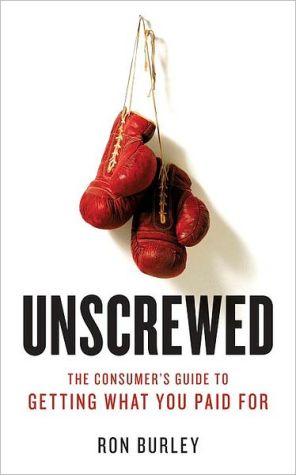Unscrewed: The Consumer's Guide to Getting What You Paid For
Every four seconds an unsuspecting consumer is duped by a cable company, cell phone provider, auto repair shop, or one of the numerous other businesses we use on a daily basis. As customer service departments have become automated wastelands, our ability to get satisfaction within the conventional complaint system has eroded. In UNSCREWED, consumer advocate Ron Burley offers a quick and easy five-step plan to getting what we paid for. This powerful and informative guide makes clear who to...
Search in google:
Every four seconds an unsuspecting consumer is duped by a cable company, cell phone provider, auto repair shop, or one of the numerous other businesses we use on a daily basis. As customer service departments have become automated wastelands, our ability to get satisfaction within the conventional complaint system has eroded. In UNSCREWED, consumer advocate Ron Burley offers a quick and easy five-step plan to getting what we paid for. This powerful and informative guide makes clear who to talk to, what to say, and when to walk away. It also explainsWhy companies don't treat you fairly, and what you can do about itHow to avoid the voicemail trapHow to get customer service representatives to pay attention to youHow to keep from getting screwed in the first placeUNSCREWED features sixteen true stories about average folks who got real results, and shares a variety of creative techniques that are both legal and successful. You don't have to be pushy, loud, or aggressive to get what you deserve—you just have to read this book.Reviews“If we are sufficiently angered and motivated, now we will know what we ought to do.”—Miami Herald“A terrific resource. . . I was so impressed by the simplicity of the techniques that I almost yearned to have a consumer conflict.”—Better Investing"[Burley's] basic strategy of thinking like the company to get your problem fixed is ingenious. If consumers approached disputes in his way, the caveat 'buyer beware' would surely be flipped on its head."—USA TodaySee the full USA Today review Watch the CNN Interview
UNSCREWED\ THE CONSUMER'S GUIDE TO GETTING WHAT YOU PAID FOR \ \ \ By RON BURLEY \ TEN SPEED PRESS \ Copyright © 2006 \ Ron Burley\ All right reserved.\ \ ISBN: 978-1-58008-762-9 \ \ \ \ \ Chapter One THE PROBLEM\ THE EROSION OF CONSUMER CLOUT\ I loved Democrat Howard Dean's war cry in the presidential campaign of 2004. He finished each speech by cheering, "You've got the power! You've got the power! You've got the power!" As much as I liked the message, I couldn't help thinking that most consumers feel as though they've been losing "the power." It's no wonder they feel that way: they have.\ The erosion of consumer clout is happening simultaneously in many quarters. National statistics prove it. Since 1990, consumer complaints are up more than 30 percent-while the best information available about complaint resolution tells us that fewer than 1 percent ever get resolved to the customer's satisfaction. A lot of people are taking it on the chin.\ Here are some of the numbers:\ In 2004, more than 2 million consumer complaints were filed with the Federal Trade Commission (FTC). Only 21,940 of them were investigated. Just over 2,000 cases, covering just under 25,000 of the complainants, were decided in their favor.\ The Consumer Product Safety Commission received 1.9 million reports from consumers in 2004. Fewer than 5,000 resulted in legal action.\ In 2003, more than 1.7 million cases of identity theft were reported to the FTC. Identity theft often results in a multitude of problems for the victim, who is expected to clean up the mess. Adding insult to injury, the theft is often the result of a company's lax security.\ Consumers filed more than 1.5 million complaints with the Better Business Bureaus of America (BBB) in 2004. When a complaint is filed, the BBB sends a letter to the company. However, it has no legal power or enforcement ability. Companies can simply ignore the complaint. The BBB doesn't publish a comprehensive report of offending companies. If you ask, they will tell you only the number of documented complaints filed against a specific company. Even that number is not an accurate record. A company can often have a complaint removed from the BBB files by simply writing a one-sided letter of explanation.\ SUCK YOU IN, SPIT YOU OUT\ These numbers reflect only reported incidents. Customer satisfaction surveys from several industries indicate that at least half of victimized consumers never file a complaint. The data indicate that many of these dissatisfied customers first try to have a problem solved by a company's customer service department. When that fails, rather than reporting the problem, they simply take their business elsewhere.\ In the past, customer retention was the name of the game for successful businesses. Building "brand loyalty" among consumers was the goal. It was considered bad business to have a high "churn" percentage-meaning that a company was losing a significant portion of their customer base at the same time that they were attempting to attract new customers. That's changed. Today, churn is an accepted part of many business models.\ In the cell phone industry, for example, the churn rate averages an amazing 30 percent per year. This means that nearly one-third of cell phone customers are so dissatisfied with their service every year that they choose to change carriers-and these are successful companies! More astonishing is that these statistics are for years when it meant that cell phone users would have to change their phone numbers when they changed providers. That's a big hassle, and a strong indication of how frustrated the "churned" customers must be.\ This is certainly not true for all companies or industries. Many companies have worked hard to improve customer service and reward brand loyalty. The U.S. automobile industry has made great strides in the past decade in reported levels of customer satisfaction. Yet despite those gains by the manufacturers, auto dealers rank among the companies most complained about to the Federal Trade Commission.\ The acceptance of churn is why you keep getting more and more credit card solicitations in your mailbox but can't get a live person from your current company on the phone. It's why every bank in the country is trying to get you to refinance your home, but your own bank is cutting back on services and increasing fees. The acceptance of churn means that many businesses have decided that it is less expensive to attract new customers than it is to take care of old ones. In short, for many industries, the individual customer has become disposable.\ TECHNOLOGY TO THE RESCUE\ Even companies that don't have a high churn rate are looking to cut costs and improve profit margins. In the 1990s, the buzzword for business was service. Every company was touting its high level of customer satisfaction and service. After the crash of 2000 and the subsequent recession, trimming the bottom line became more important than boosting satisfaction numbers. Laying off customer service people, who didn't really add to sales numbers, was a quick and easy cost reduction. They were often replaced with voice mail, e-mail, or Internet customer service options that cost far less.\ Companies presented these "innovations" as evidence of their attempts to become more responsive to their customers. However, anyone who's ever battled his or her way through a half-dozen levels of voice mail, only to realize that there's no way to talk with a live person, can tell you that this is Orwellian doublespeak. The voice mail service and Internet service options really present greater obstacles to customers seeking solutions.\ Other companies took a different strategy, which provided just as much bad news for consumers. Companies that couldn't entirely replace their flesh-and-blood service representatives with technological substitutes found other ways to cut customer service costs.\ Between 2000 and 2005, more than half the customer service call centers based in the United States were "offshored." Companies subcontracted their customer service needs to other companies, frequently in other countries. The largest call centers in the world are now in India and Israel. So when you finally do reach a customer service representative for Company X, that person might actually work for Company Z. Because this customer service representative is not an employee of Company X, he or she might be equipped with only a scripted set of limited solutions, none of which fits your problem.\ Even when you get through to a person who works for Company X, you might be in for a surprise. At the same time that they were limiting your customer service options, companies were limiting their liability in terms of what they were legally required to provide in terms of customer care, technical support, and product warranties.\ CLICKING AWAY YOUR RIGHTS\ Many companies, particularly software and online service vendors, have you electronically sign an "end user license agreement," or EULA, before you can use or gain access to their products. You've probably just clicked right through it as you installed a new software program. You are usually told to read a long legal document describing the limitations of a product or service before you select an on-screen button labeled, "I Agree." Most people do not realize that with that simple click, they have entered into a binding contract with the company and have agreed to all the terms of that contract.\ EULAs started out as legal protections against piracy or theft of intellectual property. The legal scouts working for the companies soon realized that they could make additional use of the EULA: they inserted a broad range of protections for the company and removed many consumer rights. Early on, a number of consumer advocates challenged the use of EULAs, but courts have repeatedly upheld the right of companies to use them.\ Even though most of us have been faced with EULAs, it's fair to say that few of us have ever actually read one. It's not that we're lazy. We're just trusting. We assume the agreements are written fairly and provide an appropriate means for settling disputes. In fact, many EULAs grant the company sole discretion to decide when and how to deal with customer issues.\ The most egregious and absurd of the stipulations in many EULAs is the ability of the software company to charge to fix a product that you've already paid for. The company might have the tact to call this repair an upgrade. But in the end, you pay twice for the same product. More than one software industry critic has quipped that "requiring a customer to pay for a software fix is the equivalent of asking someone to pay extra for tires when he buys a new car."\ THE GLOBAL CORNER STORE\ While many companies are finding ways to limit their customer service costs, they are simultaneously distancing themselves from our communities and daily lives. National and international chains have bought up smaller operations to create megacorporations, losing the important community connections that made them responsive to their customers. Your local hardware store is gone-replaced by a Home Depot outlet. These days, even a business that looks local might not be. You're often dealing with a franchise location of a national company. Unfortunately for you, franchisees often don't have much wiggle room as far as customer satisfaction policies go, and the national company has little interest in dealing with you as an individual.\ These massive retailers enter markets and push out smaller competitors. In 1999, for the first time in our nation's commercial history, nationally owned or franchise retail businesses outnumbered locally owned businesses.\ Just a few decades ago, only the largest corporations-oil, auto, and mining companies-were multinational. That is changing. Many more historically U.S. companies, in a variety of industries, from telecommunications to drug manufacturing, are now multinational or even completely foreign-owned.\ The third-largest U.S. automaker is now a German company: Mercedes purchased Chrysler to form Daimler Chrysler. IBM laptops are no longer made by IBM: the Lenovo Group of the People's Republic of China purchased that division of Big Blue in 2004. Fox Television and scores of U.S. newspapers and television stations are owned by Australian native Rupert Murdoch, who is now a naturalized U.S. citizen, primarily for the purpose of buying even more of our media infrastructure. Even the quintessential rags-to-riches American success story, Standard Oil-founded by John D. Rockefeller-is now a wholly owned subsidiary of British Petroleum.\ Despite all of the bad news about the erosion of customer clout, most companies still provide adequate levels of customer service. In this book, we're concerned with the ones that don't.\ This does not include a person or company that commits criminal fraud or theft. If that's the case, your first call should be to the local district attorney, and you should probably give up hope of ever getting your money back. The only good news is that, in some rare cases, you may have a legitimate claim to file with your insurance company.\ For all the reasons discussed in this chapter, the U.S. consumer has lost, and will continue to lose, bargaining power in the marketplace. We've become disposable commodities: it's less expensive to replace us than to please us. It's less trouble to ignore us than to listen to us, and less effort to deny a problem than to solve it.\ That is the situation we must change, and that is exactly what The Unscrewed Solution is designed to do.\ UNSCREWED TRUE STORY\ The Telephone Installation Nightmare\ A few years ago, shortly after I first began giving Unscrewed seminars, my friend Jack called me in a panic. He had just moved into a new house and set up his home office.\ Jack ran an Internet sales company from his home and needed to stay in constant communication with his customers, distant employees, and vendors. He also maintained the company web site, which was hosted off-site. Needless to say, it was crucial that he have quality phone service and a reliable connection to the Internet.\ Jack had worked with his phone company for a couple of months before the move, to make sure that the transition from the old location to the new location would go smoothly. He had arranged for a new eight-pair cable to be buried and connected at his new house. That one cable would carry all phone and Internet communications. The upgrade had cost Jack more than $1,000, but he considered it worth it to ensure that things went well on moving day.\ Because he had wanted to make sure that there would be no gap in telephone or Internet service, he was very concerned about the timing of the move. The phone company representative told him, "No problem. Don't worry. Trust me. We're on top of it." He repeatedly promised that the lines would be transferred without missing a beat.\ Moving day was a Monday, but Jack got a head start. Over the weekend, he moved all the office furniture and even plugged the phones into the jacks. Based on what the phone company representative had told him, sometime between 8:00 and 8:30 on Monday morning, the lines would magically start working.\ A little after 8:00 on Monday, Jack began scanning the morning paper and nervously checking for a dial tone every few minutes. When 8:45 had come and gone, and he still didn't hear that comforting tone when he picked up the receiver, Jack used his cell phone to call the representative. Instead of the man Jack had been talking to for many weeks, a woman answered. "I'm sorry, he's no longer with the company," she said. "Maybe I can help you. Are you currently a customer? Is this a residential or business service?"\ It was 9:00 a.m. on the first business day in his new location. Jack was talking with an agent of the phone company who didn't even know that he was a customer. Dumbfounded, Jack gave her the whole story: order numbers, phone line codes, and installation dates.\ "Have the lines been commissioned?"\ "What do you mean, 'commissioned'? Do you mean installed?" Jack was livid. "Yes, then. But all I really want to know is when my phones will work!"\ "It may take a while, sir," she replied. "We have procedures that we must follow."\ "Oh, come on! I've got a business to run!" he shouted.\ "I'm sorry, sir. I can't continue this conversation if you're going to speak to me in that way," replied the agent.\ "I'm not speaking to you in any 'way.' But you don't get it. I'm losing business because your company dropped the ball. I need this taken care of now! What are you going to do about it?" Jack waited for a response: all he got was a click, silence, and then a dial tone.\ He tried calling back, but the line was busy. He called the phone company's main service number. They gave him a "trouble code" and told him that his problem would be taken care of within three business days. He repeated his story that the original agent had promised that the lines would be up that morning. He let them know that he would be losing business and customers every minute that the lines weren't working.\ "We take all trouble calls in the order in which they're received," said the repair agent.\ "But I've been dealing with you for months on this. I doubt anybody is in line ahead of me," Jack retorted.\ "I'm sorry, but that's our policy."\ "It's a bad policy," Jack said, and pushed the "END" button on his cell phone.\ Something had to be done.\ That was when Jack called me and told me the story. We lived near each other. I told him to gather up all of the paperwork on the phone project and bring it to my office. I'd let him use my phone and Internet connection until we got his situation ... Unscrewed.\ Jack arrived fifteen minutes later-looking quite frazzled-with notes in hand. He'd done a couple of things right: he'd kept track of all the order numbers and had notes on several of the conversations. Unfortunately, he'd not gotten the name of the representative who'd hung up on him.\ The situation was urgent. Jack was losing orders by the minute. Because he'd already tried to fix things the nice way and failed, I suggested that we go straight to the top with a technique I call Faxing for Dollars. (A complete description of this technique is in chapter 13.)\ Most corporations are secretive about their internal fax numbers. They don't want to receive lots of junk faxes and they prefer that customers deal with the Customer Service Department. However, if you know where and how to look, you can usually find ways around their veil of secrecy.\ Corporations are required by law to file all kinds of disclosure documents. They are also required to disclose publicly certain correspondence. They also like to toot their own horn in press releases and encourage investment through various communications.\ (Continues...)\ \ \ \ \ Excerpted from UNSCREWED by RON BURLEY\ Copyright © 2006 by Ron Burley. Excerpted by permission.\ All rights reserved. No part of this excerpt may be reproduced or reprinted without permission in writing from the publisher.\ Excerpts are provided by Dial-A-Book Inc. solely for the personal use of visitors to this web site.\ \
Contents Acknowledgments....................ixIntroduction: Why You Need This Book....................xiUnscrewed True Story: The Unscrupulous Car Dealer....................xviChapter 1: The Problem: The Erosion of Consumer Clout....................1Unscrewed True Story: The Telephone Installation Nightmare....................7Chapter 2: The Truth About Customer Service....................11Unscrewed True Story: The Rise and Fall of Triple Time Software....................16Chapter 3: The Failure of Conventional Solutions....................21Unscrewed True Story: The Hidden Interest Bump....................26Chapter 4: The Unscrewed Solution: The Five Ps....................31Unscrewed True Story: The Shady Auto Shipper....................36Chapter 5: The Unscrewed Principle....................41Unscrewed True Story: The Bait-and-Switch Tire Store....................44Chapter 6: The Unscrewed Purpose....................49Unscrewed True Story: Screamers Never Prosper....................52Unscrewed True Story: The UnPayroll Company....................58Chapter 7: The Unscrewed Promise....................63Unscrewed True Story: The Remodeling Contractor....................68Chapter 8: The Unscrewed Power Tools....................73Unscrewed True Story: The Printer Maker....................77Chapter 9: The Unscrewed Plan....................83Unscrewed True Story: The Uncommunicative Cell Phone Company....................92Chapter 10: Anatomy of a Telephone Call....................95Unscrewed TrueStory: The Unfriendly Skies....................107Chapter 11: Anatomy of a Personal Visit....................111Unscrewed True Story: The Pee Doctors....................117Chapter 12: Five Techniques for Dealing with Small Businesses....................124Unscrewed True Story: The Terrible Travel Agency....................140Chapter 13: Five Techniques for Dealing with Big Businesses....................146Unscrewed True Story: The Monitor Manufacturer....................162Chapter 14: Three Techniques for Dealing with the Government and Megacorporations....................167Unscrewed True Story: Battling the Bureaucrats....................181Chapter 15: The Ultimate Technique....................186Unscrewed True Stories: Perfect Customer Service....................192Chapter 16: The Unscrewed Truth....................202Unscrewed True Story: Sometimes They Make It Easy....................205Index....................213








